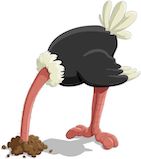 Denial is not a river in Egypt but you can drown in it Being in denial is a natural part of the grieving process, but the longer we stay in denial the more likely it will lead to self-sabotaging behavior. While in denial mode we hide our feelings, are unwilling to acknowledge the bad things happening in our life, and downplay the possible consequences of our circumstances. A classic example is an active alcoholic who denies having a drinking problem, noting how well they function in their job and relationships. A topical example might be those who are in denial about the coronavirus oddly declaring, my body my choice as they gather together in a crowd. Acharei Mot, the first of this week’s double Torah portion Acharei Mot/Kedoshim, describes the ritual of the Azazel goat. The ritual involves two goats. One is offered as a sacrifice on the altar while the other, the Azazel goat has the collective sins of the community placed on its head. It is then let go out into the wilderness along with the sins of the community, a process that has become known as scapegoating. Through this process the Azazel goat becomes the “scapegoat” for the people’s sins. Today the term scapegoat has a much more negative connotation, meaning someone or something blamed for all that goes wrong. We blame someone else and are then able to relinquish our own responsibility for our problems. Some typical scapegoats might be our families, our jobs, or the things that are missing in our lives. Denial may be a natural part of the healing process but If we wait too long to overcome it, we will find that denial may not be a river in Egypt but you can drown in it. Shabbat Shalom, Ellie  This too, shall pass. When things gets tough it’s easy to feel overwhelmed and wonder why life is so difficult. During those tough times it can feel as if our serenity, our contentment is inversely proportional to our expectations. The higher our expectations, the lower our serenity, the lower our contentment. But, if you feel like life is down in the dumps, a Zen proverb reminds us to keep going no matter how bleak things might look – This too shall pass. Until then, fetch wood, carry water, walk the earth. This week’s double Torah portion Tazria/Metzora, focuses in part on the laws of tzara’at. Tzara’at is often translated as leprosy but can also be interpreted as a plague that afflicts people, as well as garments and homes. According to the Torah, when a priest determines that an individual is afflicted with this condition: וְהִסְגִּ֧יר הַכֹּהֵ֛ן אֶת־הַנֶּ֖גַע שִׁבְעַ֥ת יָמִֽים The priest shall isolate the affected person for seven days. (Lev. 13:4) After the seven days are up, the priest is instructed to conduct another examination. Isolation is continued until the priest determines the patient is cured. The isolation is a necessary step not just as a cure but as a precaution against spreading an illness often associated with lashon ha-rah-- evil speech or gossip, to others in the community. For the one afflicted and for the community, this too shall pass. As we enter our second month of staying at home and social distancing, we are all finding ways to manage each passing day. Whether we distract ourselves with work, school, TV, movies, books, jigsaw puzzles, house cleaning, walks, or Zoom events, each of us in our own unique way, is adjusting and adapting to this new mode of living. But, as we walk around our neighborhoods, watch TV and read the newspapers, we are also continually reminded exactly what is at stake – the lives of millions of people. The future may be unclear, but like the example in this week’s Torah portion isolation isn’t a permanent condition. It is however a necessary one. In any case, this too shall pass. Shabbat Shalom, Ellie |
Archives
May 2024
|
OFFICE Hours
|
Telephone802-773-3455
|
Email ADDRESS |

 RSS Feed
RSS Feed